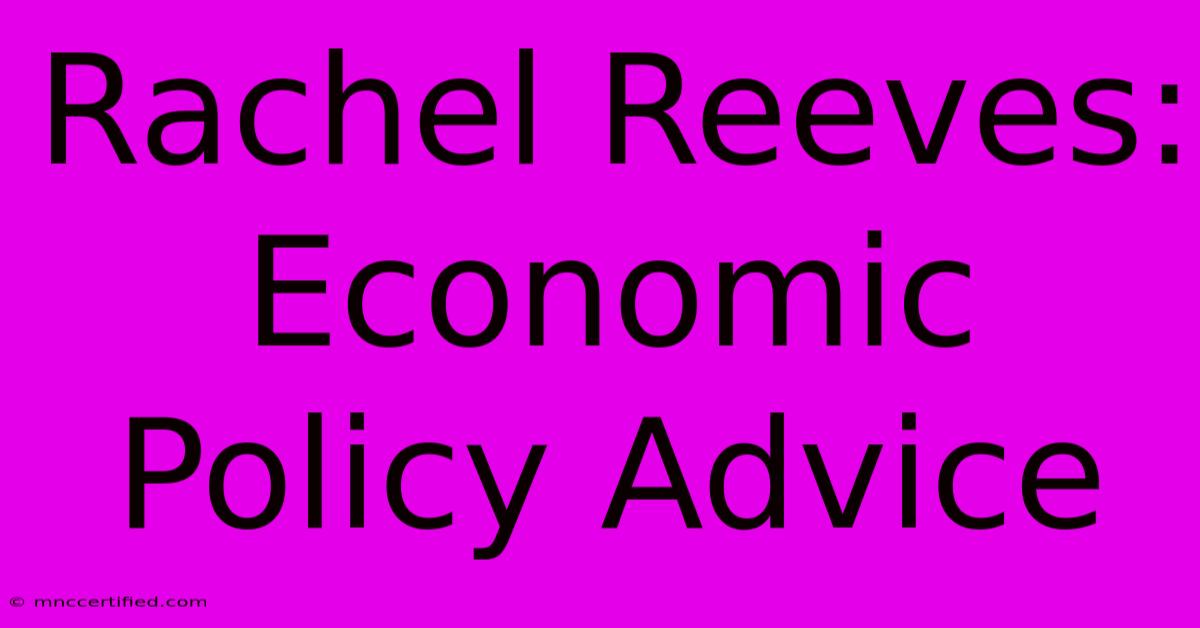Rachel Reeves: Economic Policy Advice

Table of Contents
Rachel Reeves: A Deep Dive into Her Economic Policy Advice
Rachel Reeves, the Shadow Chancellor of the Exchequer for the UK Labour Party, has become a prominent figure in British political discourse, particularly regarding economic policy. This article will delve into her key economic proposals, analyzing their potential impact and examining the criticisms they've faced. Understanding her approach is crucial for anyone seeking to comprehend the potential future direction of the UK economy under a Labour government.
Key Pillars of Rachel Reeves' Economic Policy
Reeves' economic platform is built on several key pillars, each aiming to address specific challenges facing the UK:
1. Sustainable Growth and Investment:
Reeves advocates for a shift towards sustainable, long-term economic growth. This involves significant investment in infrastructure, green technologies, and skills development. She emphasizes the need for public investment to drive innovation and productivity growth, arguing that this is vital for boosting living standards and creating high-skilled jobs. This contrasts with what she sees as the Conservatives' short-term focus and reliance on austerity measures. Keywords: sustainable growth, public investment, infrastructure investment, green technology, skills development.
2. Fairer Tax System:
A central theme in Reeves' policy is the creation of a more equitable tax system. She proposes targeted tax increases for high earners and corporations, aiming to fund increased public services and reduce income inequality. This includes plans for increased corporation tax and potentially reversing some of the recent tax cuts enacted by the Conservative government. This aspect is often debated, with critics questioning the potential impact on business investment and economic growth. Keywords: fairer tax system, tax reform, corporation tax, income inequality, tax increases.
3. Strengthening Public Services:
Reeves highlights the need to strengthen and reform public services, including the NHS, education, and social care. She advocates for increased funding and improved efficiency to ensure these services can meet the demands of a growing and ageing population. This involves not only increased spending but also efficiency improvements and potentially restructuring to optimize resource allocation. Keywords: public services, NHS funding, education reform, social care, public sector reform.
4. Made in Britain Focus:
Reeves promotes a stronger emphasis on domestic manufacturing and production, aiming to boost the UK's economic resilience and reduce reliance on global supply chains. This involves supporting British businesses and investing in skills and infrastructure to enhance the competitiveness of the UK manufacturing sector. This strategy aims to create high-skilled jobs and reduce the UK’s trade deficit. Keywords: Made in Britain, domestic manufacturing, reshoring, supply chain resilience, British industry.
Criticisms and Counterarguments
Reeves' economic proposals have not been without criticism. Opponents argue that:
- Increased taxation could stifle economic growth and deter investment.
- Increased public spending without corresponding efficiency improvements could lead to unsustainable levels of government debt.
- The focus on public sector growth might overshadow the importance of the private sector in driving economic activity.
Conclusion: A Vision for the Future?
Rachel Reeves' economic policy advice offers a distinct vision for the UK's future. Her emphasis on sustainable growth, social justice, and public investment represents a significant departure from the prevailing economic orthodoxy of recent years. While her proposals face valid criticisms, they also reflect a growing demand for a more equitable and sustainable economic model. The success of her approach will depend on effective implementation and the ability to balance ambitious goals with fiscal responsibility. Continued debate and analysis of her proposals are essential for a thorough understanding of the potential economic landscape under a Labour government.

Thank you for visiting our website wich cover about Rachel Reeves: Economic Policy Advice. We hope the information provided has been useful to you. Feel free to contact us if you have any questions or need further assistance. See you next time and dont miss to bookmark.
Featured Posts
-
Vikings Seahawks Week 16 Injury Report
Dec 23, 2024
-
2024 Nfl Playoffs Commanders Elimination
Dec 23, 2024
-
Belfast Airport Closure Impacts Christmas Travel
Dec 23, 2024
-
Usyk Interview Duboiss Interruption
Dec 23, 2024
-
Dec 22 2024 Real Madrid Defeats Sevilla 4 2
Dec 23, 2024